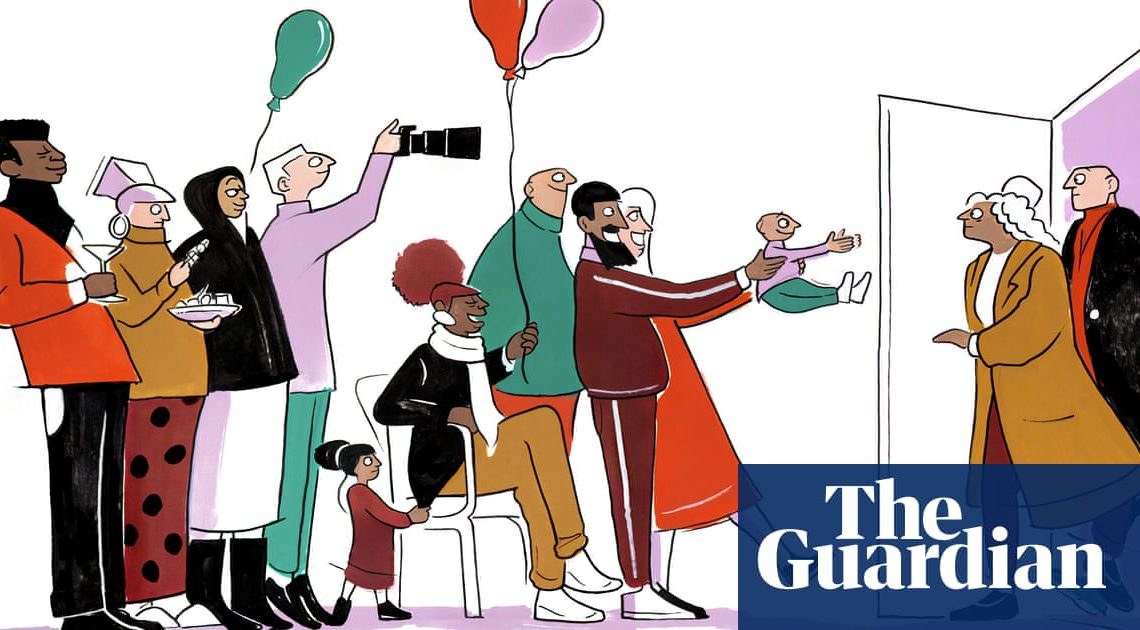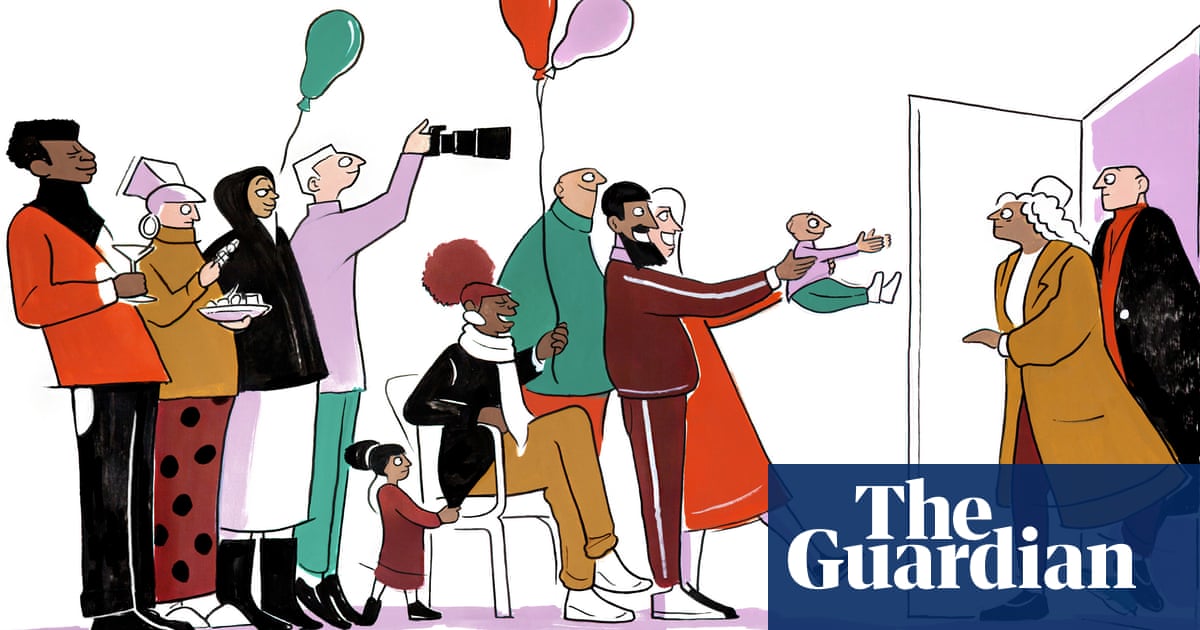
‘It locks you into a disintegrating friendship for life’: the new rules of godparenting
October 15, 2019Oddparents or squadparents: its not just the names for todays secular guardians that are causing confusion

Once upon a time in Redhill, Surrey, Sophie and Joe asked Jenny and Mark to be godparents to their baby daughter. It made perfect sense to Mark. Joe had been his best man. They went way back. But Jenny wasnt so sure.
I said no, because Im not a Christian, she recalls. They said it was fine, as they arent Christian, either, and they werent going to bother with the church bit. I still said no I didnt understand what the job I was signing up to actually was. They said it was nothing, just being around. I said no, because I dont think thats a thing.
When they turned up to the non-christening-christening party, Jenny was furious to discover that their presence had been taken as full acquiescence to godparenthood. My husband just mumbled that it was OK and bundled me out, she fumes. Its so odd. I dont understand why non-religious people would do this.
Jennys irritation may be unusual, but her feeling that the godparent thing is outdated is not. The tradition of naming one or more non-parental figures as spiritual mentors or guardians comes from the Christian baptism ceremony; there is no equivalent role in Judaism, Islam or Hinduism, as there is no baptism to bear witness to.
But there arent many Christian baptisms to bear witness to any more. The Church of England baptised only 10% of babies in England and Wales in 2017; in London, it was fewer than 5%. That compares with 75% in 1933 and 21% as recently as 1999. Catholic baptisms have also declined.
Dr Lois Lee, a sociologist at the University of Kent who co-led Understanding Unbelief, a major research project into non-religion, considers it a significant shift. Many people are worried about the decline of rite-of-passage rituals with the rise of non-religion. Baptisms and equivalents are one rite that has declined. Formal non-religious alternatives really havent emerged.
There has been little academic research into birth rituals, she says in contrast with death studies, which is a fashionable (and male-dominated) discipline. Why do we think death is so much more significant than birth and new life? Lee says. Everyone I know who has had a baby has found it pretty existentially significant. And origin stories are as crucial to religions as their accounts of the afterlife. So the lack of research is in itself interesting.
Despite the decline in baptism, many parents are still naming godparents (often with inverted commas), or creating new roles such as guideparents, oddparents, squadparents or guardians. Like Christmas, it appears to be something that nonbelievers are not prepared to renounce entirely.
Still, the ambiguity around the role can lead to misunderstanding, awkwardness and resentment, depending on who is asking whom to be whose godparent. The rich godparent may suspect she is being shaken down for birthday presents; the gay godparent may feel he is being offered a consolation prize for assumed singledom.
Its a passive-aggressive way of locking you into a disintegrating friendship for life, complains one multiple godfather, who wishes he had said no to a particular friend. Instead, I just agreed and became the worst godparent ever. It was annoying, not least because they asked six other people first.
Another friend describes her godmother as amazing. Im an only child. My parents are wonderful, but hard work. Its great to know someone whos got perspective from the past, but also has your back. As someone from a small family, it makes a huge difference. A common-or-garden friend might play that role, of course. But this just gently formalises it, she says.
So, what is a secular godparent supposed to do? Judging by celebrity godparents, that is open to interpretation. A godparent might be a paraspiritual big-sister figure, as one imagines Drew Barrymore is to her goddaughter, Frances Bean Cobain, the daughter of Kurt Cobain and Courtney Love. Alternatively, they might be an avuncular Xbox companion, as perhaps Simon Pegg is for his goddaughter, Apple Martin, the daughter of Gwyneth Paltrow and Chris Martin.
Certainly, the secondary role of the godparent guarantor of good standing within the community/provider of Oscars plus-ones has risen to the fore in these cynical times. But if you are the sort of person who is prepared to use your child as collateral in a grand social-advancement putsch, do it subtly, please. At a newspaper where I used to work, it was rumoured that a prominent columnist had asked a then prominent politician to be godparent to their child. The politician refused, apparently.
While secular equivalents to baptisms are not mainstream, they are growing in popularity. Humanists UK, which represents people who seek to live good lives without religious or superstitious beliefs, reports a 60% increase in the number of naming ceremonies in the past five years. Our experience is that almost all humanist naming ceremonies have guideparents involved, says Casey-Ann Seaniger, a spokesperson for the group. A trend we have noticed is for friends rather than relatives to be chosen. In Understanding Unbelief, family emerged as the number-one source of meaning for religious and non-religious people alike, with friends not far behind; in some ways, the guideparent bridges the two. Often, the ceremonies involve a symbolic act: planting a tree, say, or making handprints together.
Caroline Lambie has overseen more than 50 humanist naming ceremonies in the past 10 years. Most people choose four or five guideparents, she says, often for specific reasons. One might be chosen as a cultural guide. Another might be a really good cook, say. They usually make pledges that are specific to the child. I am asked to say things like: Do you promise to help the child grow as a person? To teach her how to do new things? To be there if she needs a laugh or a shoulder to cry on? To help her to reach her potential?
My wife and I freestyled our own naming day after our son was born, five years ago. The fact that not one of our friends has done the same since suggests that our selection of poems and finger food didnt hit the mark, but I am glad that we did it. It felt important to do something.
There wasnt much to serve as a template, so we had to think carefully about what we wanted to say and why we were choosing each of his five godparents. I worried that five was excessive, but I liked the idea of his godparents providing different influences at different points in his life.
While the secular interpretation of godparent is a bit of a free-for-all, the Christian interpretation is not. To be a godparent to a Catholic child, you have to be a baptised, practising Catholic (although a baptised person from another denomination can serve as an official witness). To be a godparent to an Anglican child, you need only to have been baptised.
Some vicars are more easygoing about this than others, as Simon discovered when he asked his friend Jake to be godfather to his daughter. Our very liberal, gay vicar stopped the service to ask about the religious descent of the godfather, he recalls. Jake described himself as not relating to any religion and for a while it looked as if the service wasnt going to continue. Eventually, after a pretty heated argument, a compromise was struck: My daughter would be christened, but the godfather would remain in the pews and not approach the font. The atmosphere in the church, as you can imagine, was tense after that. Since the vicar lives close to us, it has been a bit awkward subsequently.
It is always a good idea to talk these things through before you get to the font. On the other hand, misunderstandings make good bonding experiences. Simon is now guideparent to Jakes child, with no religious veneer besides generous gifting at Christmas.
But among all of the new approaches and outside-the-box thinking, one side of the equation hasnt had much of a look-in: the children themselves.
Nina, an editor from London, has had a lot of experience of being a godparent, but when it came to her turn to choose for her own children, she came up with an elegant solution.
In my early 30s, my friends started having kids and I found out I had fertility problems, she says. Maybe as an act of kindness, or because I was a handy extra pair of hands, my husband, Eddie, and I were asked over and over again to be godparents. Ive got eight or nine.
When she and her husband finally adopted children aged seven and 10 they flipped things around: We allowed them to choose their own godparents. It meant such a lot, as these people had been significant to them throughout the period of them settling into their new lives.
If you would like a comment on this piece to be considered for inclusion on Weekend magazines letters page in print, please email weekend@theguardian.com, including your name and address (not for publication).
Read more: http://www.theguardian.com/us

